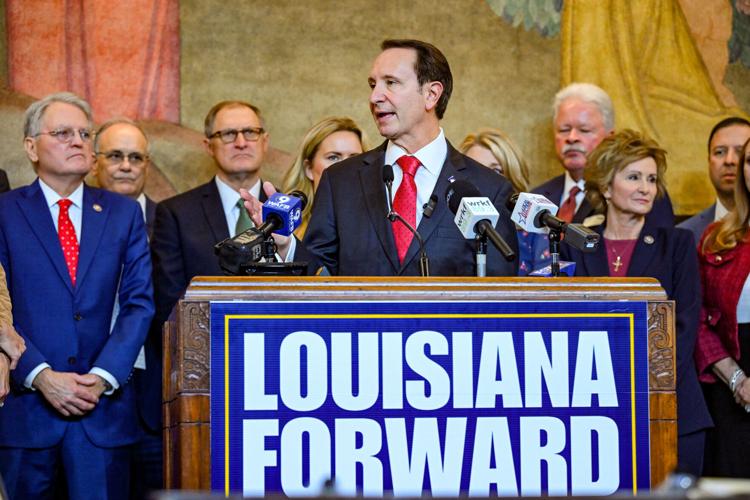In Louisiana, sales taxes are way too high. They need to come down.
By most measures, Louisianans pay the highest sales taxes (state and local combined) in the nation. This matters. Sales taxes at some level may be a necessary evil, but the use of particularly high sales taxes is just plain bad policy.
Yet less than half a year ago, Louisiana lawmakers went in the wrong direction. In the midst of a host of tax reforms and trade-offs, they actually raised state sales tax rates rather than reduced them. The rate now stands at 5 cents to the dollar, while other state tax policy essentially encourages localities also to rely heavily on sales tax for revenue. Most cities in Louisiana have a 10 cents sales tax (combined), and Baton Rouge is at 10.5. That’s awful.
The national median sales tax rate is just 7 cents.
Again, this matters. Sales taxes, even if groceries are exempted, are regressive, meaning they take a higher proportion of poor people’s money than of wealthier people’s. While other, more “progressive” taxes, such as income taxes, somewhat counteract this regressive effect, the regressivity of sales taxes doesn’t fit most people’s definition of fairness. The higher the sales tax, the greater the unfairness.
Unfairness, though, is far from the only reason high sales taxes are bad policy. Like every tax does in one way or another, sales taxes deter productive economic activity. When I served on an official, special citizen’s commission appointed to analyze Mobile, Alabama’s tax system ten years ago, our compilation of copious national research showed sales taxes are marginally more deterrent to economic growth than property taxes, while being clearly more regressive and significantly more volatile.
The latter point means that if the economy takes a downturn — as it very well might, thanks to President Donald Trump’s tariff regime — sales tax collections drop more than property tax collections. For state and local governments looking for revenue stability to provide consistent levels of law enforcement, road maintenance and education, sales taxes are a bad bet.
Nonetheless, at an April 8 meeting with the editorial board of this newspaper, Louisiana House Speaker Cameron Henry scoffed at the deleterious effects of sales taxes.
“When someone moves to a state very rarely, at least in my experience, [do] they [say] ‘how much is their sales tax?’” he said dismissively. “It's not: I was gonna move there, but your sales tax actually is a little bit too high.”
Henry clearly doesn’t understand that high sales taxes are anathema to retail establishments, especially small ‘mom and pop’ shops. It’s the existing small businessman who gets hurt worst, not the major new conglomerate.
Henry must not pay attention to polls, either. A March 30-April 2 Louisiana survey by experienced state pollster Bernie Pinsonat said last fall’s legislative special session “raised the sales tax in Louisiana in compensation for lowering of personal income taxes and some corporate taxes. Do you think this is a good thing?’
By a decisive majority of 58% to 26.6%, respondents answered “no.”
State Revenue Secretary Richard Nelson, speaking at an April 10 conference hosted by the Public Affairs Research Council, had a smart take. He said the three major taxes — sales, income, and property — should be in a position to somewhat “balance” each other, and that “you don’t want to be the worst [highest] in any” of the three.
The importance of greater balance, while offering a competitive advantage vis-à-vis other states, is the same thing the Mobile tax commission’s research showed.
Nelson also said one good thing about property taxes is that they are “more transparent,” because a citizen can’t help noticing something he pays for in one chunk in one annual bill, rather than being nickeled and dimed as a standard portion of every purchase that barely makes an impression even as it adds up to large annual sums.
This isn’t to say Louisiana needs to vastly raise its property taxes while vastly lowering sales taxes. But when your state ranks highest in the nation in the latter while only the 39th highest in the former (and with a generous homestead exemption as well!), there’s certainly room for some rebalancing while still maintaining a comparative advantage on property taxes against the large majority of states.
There’s another added advantage: Almost nobody keeps detailed enough receipts to write off sales taxes on their federal tax returns. Everybody who itemizes, though, writes off property taxes (up to a certain high limit). In other words, taxpayers shift some of the effective cost of property taxes to the federal government.
For all those reasons, a rebalancing is necessary. To repeat: One way or another, Louisiana must reduce its sales taxes.





